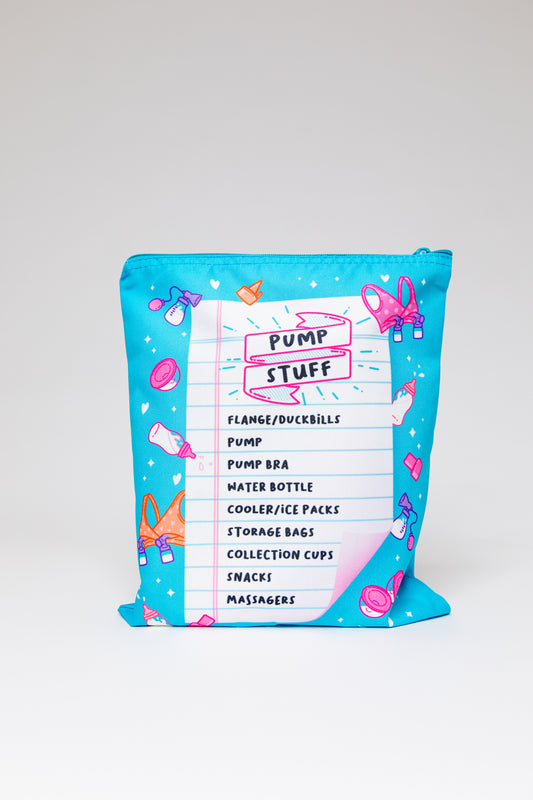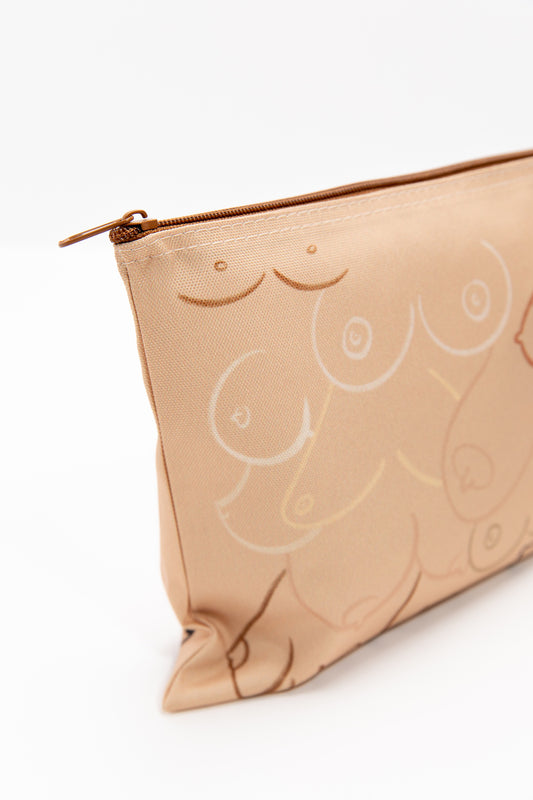
Alright ladies, this blog actually isn't for you! Pass the phone or laptop over to your partner and prepare to be *supported*!!
Listen up, partners: if you're reading this, gold star for you already. You’re either very proactive, or, more likely, you listened to your very smart, very tired breastfeeding wife who sent you this link.
Either way, WELCOME! You have a very important role to play in this whole breastfeeding adventure, though it may not be obvious from the start. She’s obviously doing all of the heavy lifting with her breastfeeding efforts, but you are the MVP of practical and emotional support. You're the person who can either make her feel like a rockstar or just add to the overwhelm.
This post is your cheat sheet to actually supporting the woman who just brought your new baby into the world — with specific things you can do that go way beyond saying, "You're doing great, babe." Let's talk about the role of partners in supporting breastfeeding moms in terms of everything from postpartum support to pump part washing.
Postpartum Support: Your Wife Just Did the Hardest Thing Ever, So Step Up
If you are a first-time parent, let me tell you - your wife is going to be in a very fragile state physically, mentally, and emotionally following birth. Whether she basically sneezed the baby out in three pushes or had a 24-hour labor followed by an emergency C-section — the days and early weeks after delivery can be pretty brutal. Expect that your wife will be in pain. This is where your active involvement becomes absolutely critical for her healing.
Have you heard about the 5-5-5 rule?
It’s an old tradition that says a new mom should spend 5 days in bed, 5 days on the bed (like, sitting up maybe, but still resting), and 5 days around the bed (moving a tiny bit more but still taking it super easy). Now, maybe this isn't completely possible for your family, depending on paternity leave length and lots of other factors, but even a little bit goes a long way. The relaxation rule is a great way to prioritize her healing — because trust me, if she tries to do too much too soon, it will only prolong the process.
Basically, Mama should not be vacuuming, loading the dishwasher, chasing the dog, lifting other kiddos, or tending to visitors during the early weeks. She should be cuddling your new baby, nourishing herself, hydrating, and healing.
Here are a few things you should know/do to help your freshly postpartum wife:
1) Stock Up on the Right Supplies
Depending on how the delivery went, you’re going to want to have some key items on hand.
-
C-Section Recovery Items (think: belly binders and wound care):
C-Section Recovery List -
Vaginal Birth Recovery Items (think: witch hazel pads, ice packs, peri bottles, and sitz baths):
Vaginal Birth Recovery List
Your wife will probably get many of these items from the hospital. But you can always ask for more from your nurses. And if you notice she's running low after you get home, purchase some more. Having these things before she’s desperate for them is a great way to be helpful in the early days.
2) Know About Afterpains
As if the delivery wasn’t enough hard work, did you know that the fun continues with postpartum contractions? Yes, that’s right. She will still have contractions after the baby is out — especially when she's breastfeeding.
When you notice this happening, offer a heating pad, a back rub, or maybe some chocolate as a reward for pushing through. Chocolate is always the answer. Remind her that these won't last forever. Her uterus is just doing it's best to get back to normal.
3) Stay on Top of Medications
Another easy but hugely helpful task for you? Stay on top of her meds. She’s probably supposed to be taking a lovely little cocktail of ibuprofen and Tylenol, and if she had a C-section, she might have prescriptions too. Set alarms if you have to. Keep a little notebook. Bring her the meds with a big glass of water. Don’t make her ask.
And if she gets sick, you can help her make sure that anything she takes is breastfeeding-safe. Here's the guide you’ll want to bookmark: Breastfeeding Safe Medications
Your active involvement during these early weeks makes a world of difference. The more you do now to help her heal, the sooner you’ll have a wife who doesn’t want to smack you in your sleep. (Kidding...Mostly.)
Breastfeeding Support
The meat and potatoes of this post - let’s talk about the role of partners in supporting breastfeeding moms specifically.
First, some general feeding guidelines: babies need to eat every 2–3 hours during the first few weeks, whether they’re nursing or bottle-feeding. Yes, this means even throughout the night. If your wife is passionate about exclusive breastfeeding (which can mean nursing, pumping, or both), you’ll need to have alarms set to wake your baby (and your baby mama) up for those feeds or pumps. She'll appreciate not having to worry about setting the alarms while she gets used to this new schedule. Newborns are so sleepy in the early weeks that they might not always wake up on their own to eat. Skipping feeds can mess with both your baby’s weight gain and your wife’s milk supply. Your active support here is a great way to keep everything on track. You won't need to set alarms throughout the night for very long. Once your baby is back to birth weight, most pediatricians will tell you that you can let them sleep as long as they are able at night.

Nursing
If your wife is trying to nurse, be prepared: there’s a huge learning curve, even if this isn't your first baby. The most important thing in the early weeks is developing a good latch. You can be a major help by sitting near her and reminding her of these practical ways to get a good latch:
- Baby’s mouth should open wide for an astmmetrical latch to take in both breast and nipple, not just the nipple.
- While a bit of discomfort in the first 30 seconds to 1 minute is normal, it should subside after that if the latch is correct.
Over the first couple of weeks of nursing, your wife may experience some skin sensitivity, cracking, and maybe a little bleeding as her body adjusts to nursing. But if you notice intense nipple trauma — like consistent bleeding, cracking, or her sobbing through every feed — make the call to a lactation consultant. Call your OB’s office or the hospital where she delivered and ask to be connected to lactation. Set up an in-person appointment, even if she says she doesn’t want to go. A lactation consultant could be the difference between quitting and success, especially if this is your wife's first breastfeeding experience.

Keep in mind: breastfed babies can nurse for up to 30 minutes per side. Sometimes they’ll fall asleep mid-feed without getting a full meal, so you can help by gently rubbing a cool washcloth on the baby’s skin or stripping them down to just a diaper to keep them awake. When it’s time to feed, offer to remove baby’s clothing and get everything set up for your wife. She may request a breastfeeding pillow to make things more comfortable.
*Pro-Tip: Middle of the Night Feeds*
Active support during night feeds means doing everything except actually nursing. Get the baby up, prop up mom's pillows exactly how she likes them, hand her the baby, and after the feed, you change the diaper and settle the baby back down so she can immediately go back to sleep. That’s a great way to help a nursing mother keep going when the exhaustion hits hard.
Pumping
If your wife decides to pump (either exclusively or just sometimes), your job is still very important! In the hospital, she can use their pump, but once you're home, she’ll probably have a personal pump from insurance. If she’s never used it before, do her a favor and watch a YouTube tutorial so you can help her set it up properly.
Help her stay on a pumping schedule: every 2–3 hours for around 30 minutes. When it's time, bring her the pump and all the parts. When she’s done, take everything from her. You can immediately store the pump parts in a Ziplock bag in the fridge between sessions, and they only need to be washed once every 24 hours if refrigerated.
Want a practical way to make the pump game a little easier? Get this awesome bottle and pump part washer and dryer that does everything for you.
If your wife pumps more milk than what your baby needs right away in one session (In the early weeks, baby will only need 1–3 oz per feed), use the pitcher method, which means combining all the milk into one container and storing it in the fridge. Here’s a guide on how to use the pitcher method. Milk is good for 4 days in the fridge before it needs to be frozen in bags. You can do this too, Dad! At the end of each day, it might be a good idea to pour any excess milk (perhaps any that has been in the fridge for almost 4 days) into storage bags in 2-4 ounce amounts, label with date and amount, and place in freezer.
Again, anything you can take off of your wife's plate when it comes to breastfeeding is helpful!
Clogged Ducts
Help your wife watch out for clogged ducts. A clogged duct happens when milk flow is obstructed. It often causes a painful lump and/or redness on the breast. If not treated, it can turn into mastitis, which includes symptoms like fever, chills, achiness, and just generally feeling like you got hit by a truck. If you notice any of these mastitis symptoms, call your wife’s doctor immediately and get her an appointment. Here’s more info on dealing with clogged ducts if you want to be extra prepared.
Bottle Feeding
If you’re bottle-feeding the baby pumped breast milk, try to use paced feeding: this means holding the bottle horizontally and letting baby work for the milk a bit instead of just dumping it down their throat. Always offer to handle feedings if your wife is exclusively pumping. And, if she’s nursing and you want to give a bottle of expressed milk, remind her to pump during that missed nursing session. Otherwise, she might experience engorgement or a drop in supply.
Hunger and Thirst
Breastfeeding also makes you SO THIRSTY. Like, crawling-across-the-desert thirsty. Make sure her water bottle is always full. And don’t forget to supply some healthy snacks too — quick things like granola bars, fruit, trail mix — anything she can eat one-handed while nursing or pumping.
Get her a bemybreastfriend water bottle -- or two for easy swap outs!
Supporting your wife through breastfeeding is some of the best active involvement you can offer. And don’t hesitate to loop in health professionals (like a lactation consultant) early if things get too challenging to handle on your own.
Mental and Emotional Needs
Now let’s talk about something that's perhaps just as important as breastfeeding support: your role in your wife's mental and emotional needs. After delivery, her hormones are absolutely out of whack — even more so than during pregnancy. It’s like emotional musical chairs in her brain. Add breastfeeding into the mix, and it’s a whole new wave of hormone surges. Even if your wife has previous breastfeeding experience, every postpartum period is different, and she’ll still need active support from you.
Baby Blues
One of the most practical ways you can be a supportive partner is simply by listening. Talk through things with her. Let her cry without trying to "fix it." When she's crying over something that makes absolutely no sense, remind her that she's not crazy. Sometimes just being there is enough. Be patient. Understand that the "baby blues" are normal — it's common to feel teary, overwhelmed, or anxious during the first week or two. BUT, positive attitudes, encouragement, and patience alone won't fix it if something deeper is going on. If you notice your wife is struggling beyond the typical baby blues — like she can’t function normally, is crying for multiple hours a day, is having intrusive thoughts, or seems completely disconnected — call her health care professionals (yes, YOU do it!). And go with her to the appointment. Sometimes new moms downplay their symptoms out of guilt or fear, and having a supportive partner advocate for her to a doctor can make a huge difference. She’s not weak, she’s not failing — postpartum depression and anxiety are very real. They are treatable, but often not without the right support from professionals.
Sleep Deprivation
Sleep deprivation is going to hit you hard. Yes, you’ll both be tired. But trust that if your wife is a breastfeeding mom, she's going to be twice as exhausted as you are. It's not a competition, just a reality. Nursing, pumping, and recovering from childbirth are physically draining. So, hold the baby and let your wife nap every chance she gets. Encourage her to take breaks away from the chaos, rest with a good book, and shut her eyes during the day while you handle things. A well-rested nursing mother is a happier, healthier one.
Please know that this very hard season of newborn chaos will not last forever. But in those first few weeks, showing up as the vital role of the supportive partner she needs will mean everything. And while we're on the topic of helping your wife emotionally, tell her she looks beautiful. Every. Single. Day.
Other Duties:
Alright, now onto the stuff nobody wants to do, but that absolutely has to get done somehow: household chores, cooking meals, wrangling other young children, and keeping everything running while mama recovers.
If you want to set your wife up for successful breastfeeding and recovery, your practical support here is critical. She can’t focus on nursing, pumping, and healing if she’s constantly worried about dishes piling up or laundry spilling over. As new parents, your crucial role is handling the background stuff so she can focus on the baby.
This means you cook, wash dishes, do the never ending piles of laundry (even if you can't always get to the folding), and tackle the never-ending mountain of other chores without being asked. No, your house isn't going to be perfect during this season. But without your help, it can feel overwhelming fast. Little goals each day are good. For example, "Today I am going to wash and dry one load of laundry, wash all of the pump parts before noon, and sweep the kitchen floor."
If you have other kids, this is the time to really be their anchor. Assure your wife that they are safe and loved extra well by you during this time. Keep them busy with fun activities outside of the house, handle bedtime, and make the time feel special. Young siblings are adjusting too.
*A little heads up:* Well-meaning family members might swoop in with unhelpful advice or negative comments. Be the shield for your wife. If someone says something that makes your wife second-guess herself or feel bad, block that nonsense with a smile and redirect the conversation.
Newborn life is messy and wild. We know that you are stressed too. Your help in handling all of these extra responsibilities helps keep everyone afloat.
Wrapping It Up
Bringing home a new baby is overwhelming, exhausting, and incredible all at once, whether it's your first or your fifth. Your support can make a significant difference. The role of partners in supporting breastfeeding moms isn’t just about moral support; it’s about jumping in, helping in practical ways and being present every step of the way.
You have an important role in helping your wife meet her breastfeeding goals, whatever they are, and to make her feel cared for and seen. Whether she’s nursing, pumping, combo feeding, or figuring it all out day-by-day, your active support during each step of the breastfeeding journey matters more than you probably realize.
Please know that it’s not about doing everything perfectly. Just be her teammate through all the chaos and beautiful moments that come with newborn life.
She is so lucky to have you, even if she doesn't get the chance to say it today.







